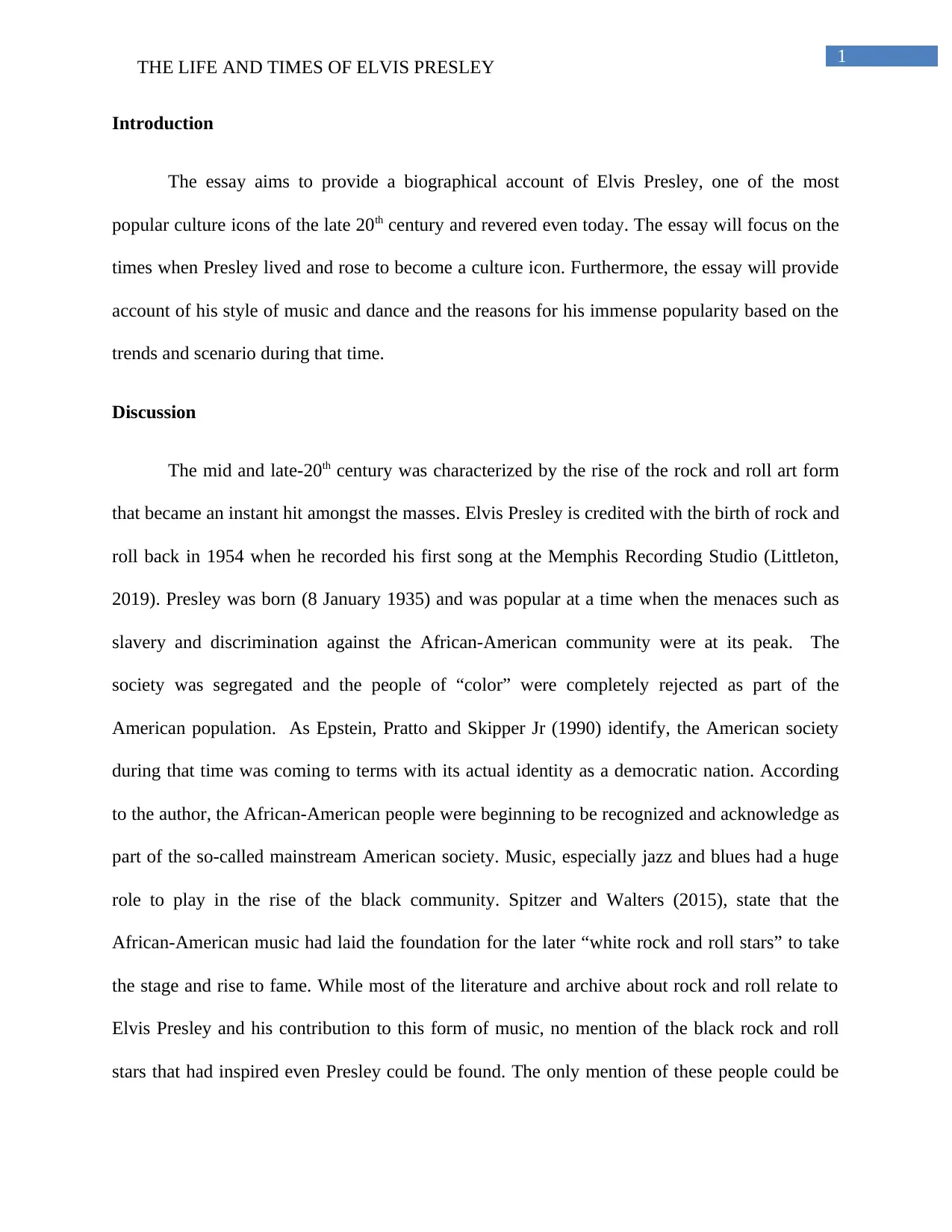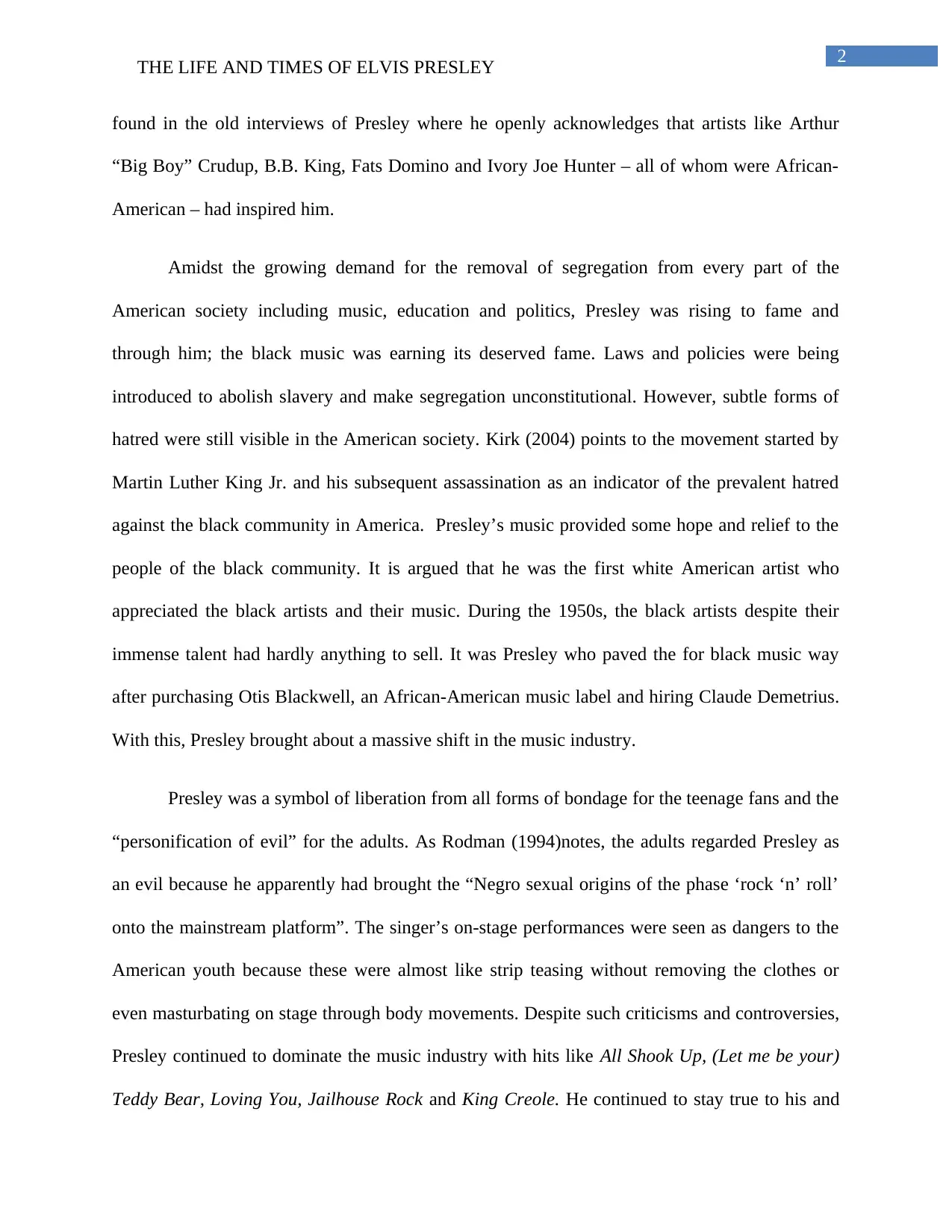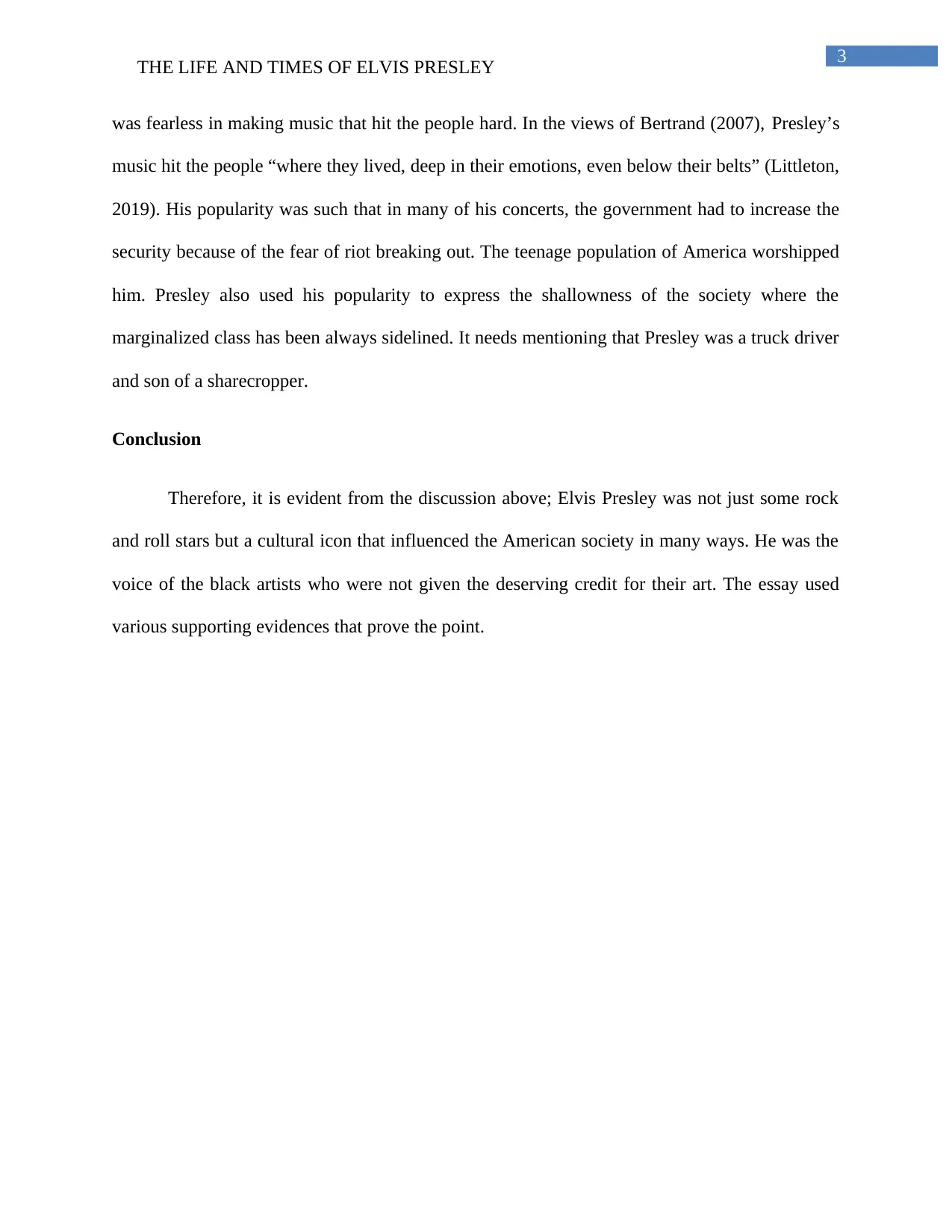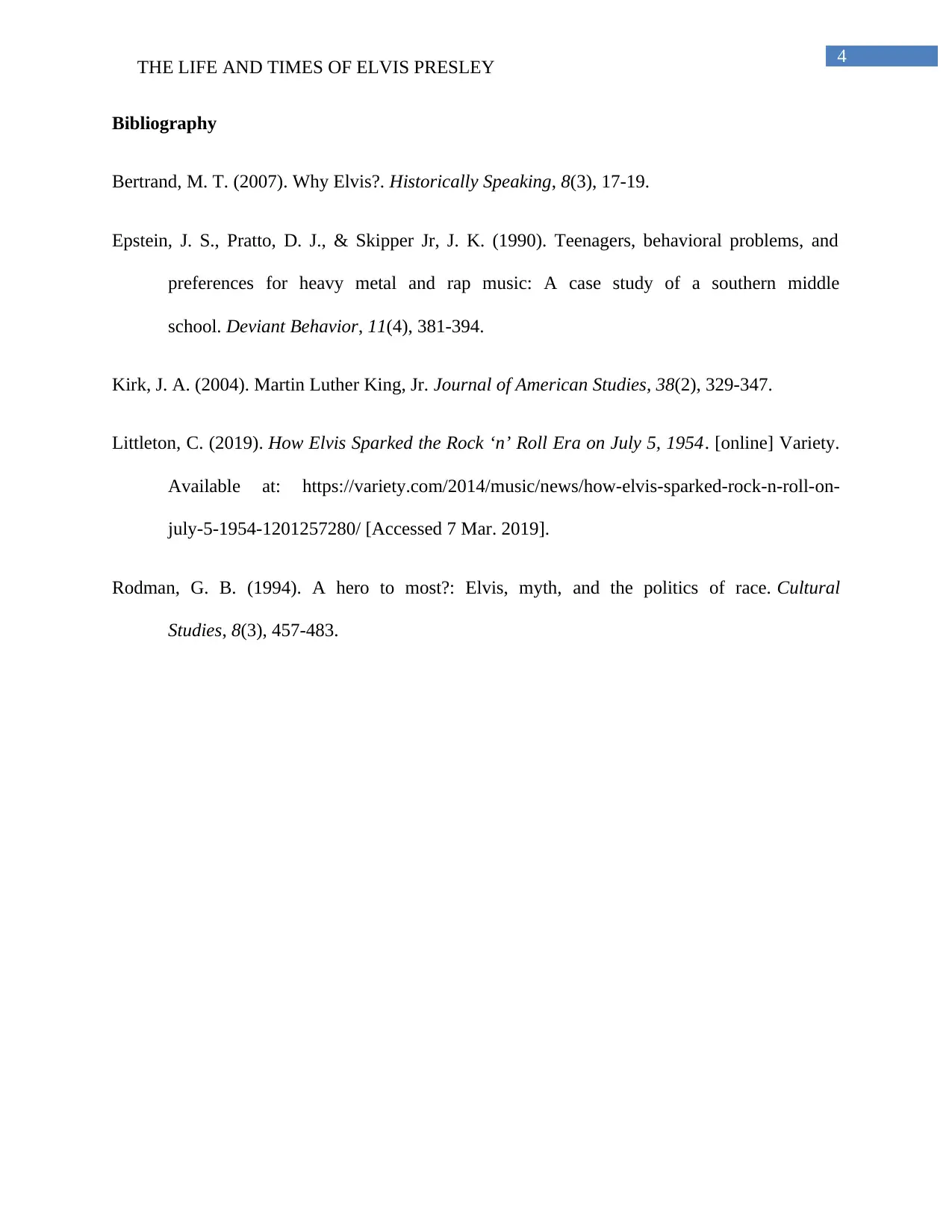Western Civilization II: Biography of Elvis Presley
VerifiedAdded on 2023/04/25
|5
|1154
|436
Essay
AI Summary
This essay provides a biographical account of Elvis Presley, a prominent cultural icon of the late 20th century, focusing on his rise to fame and influence during a period of significant social change. The essay explores Presley's musical style, his contribution to rock and roll, and his immense popularity, considering the societal trends of the time. It highlights the context of racial segregation and the emergence of African-American music, acknowledging Presley's appreciation for black artists. The essay examines how Presley's music provided hope and relief to the black community and his role in shifting the music industry. It also addresses the controversies surrounding his performances and his impact on American youth. The conclusion emphasizes Presley's status as a cultural icon who influenced American society and gave voice to marginalized artists. The essay uses various supporting evidences to prove the point.

Running head: THE LIFE AND TIMES OF ELVIS PRESLEY
THE LIFE AND TIMES OF ELVIS PRESLEY
Name of the student
Name of the university
Author note
THE LIFE AND TIMES OF ELVIS PRESLEY
Name of the student
Name of the university
Author note
Paraphrase This Document
Need a fresh take? Get an instant paraphrase of this document with our AI Paraphraser

1
THE LIFE AND TIMES OF ELVIS PRESLEY
Introduction
The essay aims to provide a biographical account of Elvis Presley, one of the most
popular culture icons of the late 20th century and revered even today. The essay will focus on the
times when Presley lived and rose to become a culture icon. Furthermore, the essay will provide
account of his style of music and dance and the reasons for his immense popularity based on the
trends and scenario during that time.
Discussion
The mid and late-20th century was characterized by the rise of the rock and roll art form
that became an instant hit amongst the masses. Elvis Presley is credited with the birth of rock and
roll back in 1954 when he recorded his first song at the Memphis Recording Studio (Littleton,
2019). Presley was born (8 January 1935) and was popular at a time when the menaces such as
slavery and discrimination against the African-American community were at its peak. The
society was segregated and the people of “color” were completely rejected as part of the
American population. As Epstein, Pratto and Skipper Jr (1990) identify, the American society
during that time was coming to terms with its actual identity as a democratic nation. According
to the author, the African-American people were beginning to be recognized and acknowledge as
part of the so-called mainstream American society. Music, especially jazz and blues had a huge
role to play in the rise of the black community. Spitzer and Walters (2015), state that the
African-American music had laid the foundation for the later “white rock and roll stars” to take
the stage and rise to fame. While most of the literature and archive about rock and roll relate to
Elvis Presley and his contribution to this form of music, no mention of the black rock and roll
stars that had inspired even Presley could be found. The only mention of these people could be
THE LIFE AND TIMES OF ELVIS PRESLEY
Introduction
The essay aims to provide a biographical account of Elvis Presley, one of the most
popular culture icons of the late 20th century and revered even today. The essay will focus on the
times when Presley lived and rose to become a culture icon. Furthermore, the essay will provide
account of his style of music and dance and the reasons for his immense popularity based on the
trends and scenario during that time.
Discussion
The mid and late-20th century was characterized by the rise of the rock and roll art form
that became an instant hit amongst the masses. Elvis Presley is credited with the birth of rock and
roll back in 1954 when he recorded his first song at the Memphis Recording Studio (Littleton,
2019). Presley was born (8 January 1935) and was popular at a time when the menaces such as
slavery and discrimination against the African-American community were at its peak. The
society was segregated and the people of “color” were completely rejected as part of the
American population. As Epstein, Pratto and Skipper Jr (1990) identify, the American society
during that time was coming to terms with its actual identity as a democratic nation. According
to the author, the African-American people were beginning to be recognized and acknowledge as
part of the so-called mainstream American society. Music, especially jazz and blues had a huge
role to play in the rise of the black community. Spitzer and Walters (2015), state that the
African-American music had laid the foundation for the later “white rock and roll stars” to take
the stage and rise to fame. While most of the literature and archive about rock and roll relate to
Elvis Presley and his contribution to this form of music, no mention of the black rock and roll
stars that had inspired even Presley could be found. The only mention of these people could be

2
THE LIFE AND TIMES OF ELVIS PRESLEY
found in the old interviews of Presley where he openly acknowledges that artists like Arthur
“Big Boy” Crudup, B.B. King, Fats Domino and Ivory Joe Hunter – all of whom were African-
American – had inspired him.
Amidst the growing demand for the removal of segregation from every part of the
American society including music, education and politics, Presley was rising to fame and
through him; the black music was earning its deserved fame. Laws and policies were being
introduced to abolish slavery and make segregation unconstitutional. However, subtle forms of
hatred were still visible in the American society. Kirk (2004) points to the movement started by
Martin Luther King Jr. and his subsequent assassination as an indicator of the prevalent hatred
against the black community in America. Presley’s music provided some hope and relief to the
people of the black community. It is argued that he was the first white American artist who
appreciated the black artists and their music. During the 1950s, the black artists despite their
immense talent had hardly anything to sell. It was Presley who paved the for black music way
after purchasing Otis Blackwell, an African-American music label and hiring Claude Demetrius.
With this, Presley brought about a massive shift in the music industry.
Presley was a symbol of liberation from all forms of bondage for the teenage fans and the
“personification of evil” for the adults. As Rodman (1994)notes, the adults regarded Presley as
an evil because he apparently had brought the “Negro sexual origins of the phase ‘rock ‘n’ roll’
onto the mainstream platform”. The singer’s on-stage performances were seen as dangers to the
American youth because these were almost like strip teasing without removing the clothes or
even masturbating on stage through body movements. Despite such criticisms and controversies,
Presley continued to dominate the music industry with hits like All Shook Up, (Let me be your)
Teddy Bear, Loving You, Jailhouse Rock and King Creole. He continued to stay true to his and
THE LIFE AND TIMES OF ELVIS PRESLEY
found in the old interviews of Presley where he openly acknowledges that artists like Arthur
“Big Boy” Crudup, B.B. King, Fats Domino and Ivory Joe Hunter – all of whom were African-
American – had inspired him.
Amidst the growing demand for the removal of segregation from every part of the
American society including music, education and politics, Presley was rising to fame and
through him; the black music was earning its deserved fame. Laws and policies were being
introduced to abolish slavery and make segregation unconstitutional. However, subtle forms of
hatred were still visible in the American society. Kirk (2004) points to the movement started by
Martin Luther King Jr. and his subsequent assassination as an indicator of the prevalent hatred
against the black community in America. Presley’s music provided some hope and relief to the
people of the black community. It is argued that he was the first white American artist who
appreciated the black artists and their music. During the 1950s, the black artists despite their
immense talent had hardly anything to sell. It was Presley who paved the for black music way
after purchasing Otis Blackwell, an African-American music label and hiring Claude Demetrius.
With this, Presley brought about a massive shift in the music industry.
Presley was a symbol of liberation from all forms of bondage for the teenage fans and the
“personification of evil” for the adults. As Rodman (1994)notes, the adults regarded Presley as
an evil because he apparently had brought the “Negro sexual origins of the phase ‘rock ‘n’ roll’
onto the mainstream platform”. The singer’s on-stage performances were seen as dangers to the
American youth because these were almost like strip teasing without removing the clothes or
even masturbating on stage through body movements. Despite such criticisms and controversies,
Presley continued to dominate the music industry with hits like All Shook Up, (Let me be your)
Teddy Bear, Loving You, Jailhouse Rock and King Creole. He continued to stay true to his and
⊘ This is a preview!⊘
Do you want full access?
Subscribe today to unlock all pages.

Trusted by 1+ million students worldwide

3
THE LIFE AND TIMES OF ELVIS PRESLEY
was fearless in making music that hit the people hard. In the views of Bertrand (2007), Presley’s
music hit the people “where they lived, deep in their emotions, even below their belts” (Littleton,
2019). His popularity was such that in many of his concerts, the government had to increase the
security because of the fear of riot breaking out. The teenage population of America worshipped
him. Presley also used his popularity to express the shallowness of the society where the
marginalized class has been always sidelined. It needs mentioning that Presley was a truck driver
and son of a sharecropper.
Conclusion
Therefore, it is evident from the discussion above; Elvis Presley was not just some rock
and roll stars but a cultural icon that influenced the American society in many ways. He was the
voice of the black artists who were not given the deserving credit for their art. The essay used
various supporting evidences that prove the point.
THE LIFE AND TIMES OF ELVIS PRESLEY
was fearless in making music that hit the people hard. In the views of Bertrand (2007), Presley’s
music hit the people “where they lived, deep in their emotions, even below their belts” (Littleton,
2019). His popularity was such that in many of his concerts, the government had to increase the
security because of the fear of riot breaking out. The teenage population of America worshipped
him. Presley also used his popularity to express the shallowness of the society where the
marginalized class has been always sidelined. It needs mentioning that Presley was a truck driver
and son of a sharecropper.
Conclusion
Therefore, it is evident from the discussion above; Elvis Presley was not just some rock
and roll stars but a cultural icon that influenced the American society in many ways. He was the
voice of the black artists who were not given the deserving credit for their art. The essay used
various supporting evidences that prove the point.
Paraphrase This Document
Need a fresh take? Get an instant paraphrase of this document with our AI Paraphraser

4
THE LIFE AND TIMES OF ELVIS PRESLEY
Bibliography
Bertrand, M. T. (2007). Why Elvis?. Historically Speaking, 8(3), 17-19.
Epstein, J. S., Pratto, D. J., & Skipper Jr, J. K. (1990). Teenagers, behavioral problems, and
preferences for heavy metal and rap music: A case study of a southern middle
school. Deviant Behavior, 11(4), 381-394.
Kirk, J. A. (2004). Martin Luther King, Jr. Journal of American Studies, 38(2), 329-347.
Littleton, C. (2019). How Elvis Sparked the Rock ‘n’ Roll Era on July 5, 1954. [online] Variety.
Available at: https://variety.com/2014/music/news/how-elvis-sparked-rock-n-roll-on-
july-5-1954-1201257280/ [Accessed 7 Mar. 2019].
Rodman, G. B. (1994). A hero to most?: Elvis, myth, and the politics of race. Cultural
Studies, 8(3), 457-483.
THE LIFE AND TIMES OF ELVIS PRESLEY
Bibliography
Bertrand, M. T. (2007). Why Elvis?. Historically Speaking, 8(3), 17-19.
Epstein, J. S., Pratto, D. J., & Skipper Jr, J. K. (1990). Teenagers, behavioral problems, and
preferences for heavy metal and rap music: A case study of a southern middle
school. Deviant Behavior, 11(4), 381-394.
Kirk, J. A. (2004). Martin Luther King, Jr. Journal of American Studies, 38(2), 329-347.
Littleton, C. (2019). How Elvis Sparked the Rock ‘n’ Roll Era on July 5, 1954. [online] Variety.
Available at: https://variety.com/2014/music/news/how-elvis-sparked-rock-n-roll-on-
july-5-1954-1201257280/ [Accessed 7 Mar. 2019].
Rodman, G. B. (1994). A hero to most?: Elvis, myth, and the politics of race. Cultural
Studies, 8(3), 457-483.
1 out of 5
Related Documents
Your All-in-One AI-Powered Toolkit for Academic Success.
+13062052269
info@desklib.com
Available 24*7 on WhatsApp / Email
![[object Object]](/_next/static/media/star-bottom.7253800d.svg)
Unlock your academic potential
Copyright © 2020–2026 A2Z Services. All Rights Reserved. Developed and managed by ZUCOL.





